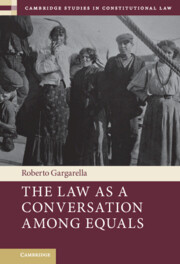Book contents
- The Law As a Conversation among Equals
- Cambridge Studies in Constitutional Law
- The Law As a Conversation among Equals
- Copyright page
- Contents
- Preface
- Acknowledgments
- 1 Constitutionalism and Democracy
- 2 The Law As Conversation among Equals
- 3 “Democratic Dissonance”
- 4 A Constitution Marked by a “Discomfort with Democracy”
- 5 Motivations and Institutions: “If Men Were Angels”
- 6 The Structural Difficulties of Representation
- 7 The Rise and Fall of Popular Control
- 8 The Periodic Vote, or “Electoral Extortion”
- 9 Checks and Balances
- 10 Presidentialism
- 11 Rights
- 12 Social Rights and the “Engine Room”
- 13 Judicial Review
- 14 Constitutional Interpretation
- 15 Constitution Making
- 16 The Birth of Dialogical Constitutionalism
- 17 Why We Care About Dialogue
- 18 “Democratic Erosion”
- 19 The New Deliberative Assemblies
- 20 Conclusion
- Bibliography
- Index
1 - Constitutionalism and Democracy
An Institutional Problem of Structural Nature
Published online by Cambridge University Press: 25 April 2022
- The Law As a Conversation among Equals
- Cambridge Studies in Constitutional Law
- The Law As a Conversation among Equals
- Copyright page
- Contents
- Preface
- Acknowledgments
- 1 Constitutionalism and Democracy
- 2 The Law As Conversation among Equals
- 3 “Democratic Dissonance”
- 4 A Constitution Marked by a “Discomfort with Democracy”
- 5 Motivations and Institutions: “If Men Were Angels”
- 6 The Structural Difficulties of Representation
- 7 The Rise and Fall of Popular Control
- 8 The Periodic Vote, or “Electoral Extortion”
- 9 Checks and Balances
- 10 Presidentialism
- 11 Rights
- 12 Social Rights and the “Engine Room”
- 13 Judicial Review
- 14 Constitutional Interpretation
- 15 Constitution Making
- 16 The Birth of Dialogical Constitutionalism
- 17 Why We Care About Dialogue
- 18 “Democratic Erosion”
- 19 The New Deliberative Assemblies
- 20 Conclusion
- Bibliography
- Index
Summary
In the first chapter of the book, I refer to the existing tensions between constitutionalism and democracy. More specifically, I focus on the difficulties shown by the prevailing constitutional system to carry out the main promises it made at its foundational moment—the promises on which its legitimacy stands: its inclusive promise (the promise of “full representation”); its promise of respect for the rights of overlooked minorities; and -most significantly- its promise to recognize the sovereignty of the people’s voice. In this chapter, I maintain that present institutions are no longer capable of meeting the expectations that they generated, while the society increasingly sees them as alien, distant, and removed.
Keywords
- Type
- Chapter
- Information
- The Law As a Conversation among Equals , pp. 1 - 15Publisher: Cambridge University PressPrint publication year: 2022

